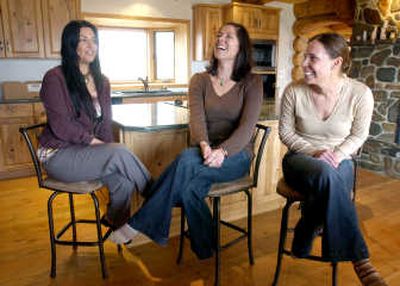‘Rez Chef’ cooks it old-style

POST CREEK, Mont. – Jody Perez was sure that when, after a week at a Traditional Living Challenge Camp, she stepped on the bathroom scales back home, she wouldn’t like what she saw.
“I really thought I was overeating all week,” Perez said. There were buffalo and elk steaks, salmon, dried meat, vegetables, fruit – even camas that participants harvested, peeled, dried and baked in the ground with black tree moss wrapped in skunk cabbage leaves.
“People use camas in soups sometimes, and if you boil it, you get a bitter taste,” said Heather Cahoon, Perez’s sister. “But baking it made it so sweet; it was similar to a yam.”
The food at the camp was delicious, plentiful – and, it turned out, good on the waistline.
Perez ate to her heart’s (and stomach’s) content, and lost 6 pounds in the process.
Her four young children spent the week living in a tepee at the camp with her, and Perez was none too pleased when her husband, Juan, picked the kids up at Blue Bay and immediately took them to the drive-through at McDonald’s in Polson.
She was sold on the benefits of a healthier, and more traditional, diet.
Simply by reading package labels and substituting healthier or more traditional alternatives in recipes in the months since, Perez has lost more weight – a total of 25 pounds – and stumbled on a new mini-career in the process.
She’s co-host, along with Genevieve King, of a new cooking show, “Rez Chef,” that premiered last week on the public television station at Salish Kootenai College.
King and Perez – and their guests – weave cooking and healthier lifestyles in with Indian tradition and culture on the half-hour program.
Anita Dupuis, director of the Salish Kootenai College Community Health and Development Department, came up with the ideas and grant money for both the traditional living camps and the cooking show.
“Historically, Native American genetics weren’t made to properly digest and metabolize non-Native cuisine, i.e., sugar, flour and trans fat,” Dupuis explains. Her goal is to help Flathead Indian Reservation residents combat diabetes and cardiovascular disease by returning to more traditional diets, or using foods with nutritional values similar to what their ancestors ate.
“In order to be successful, an intervention in Native communities must speak to who we are, must be based in and founded upon the traditional wisdom of our ancestors, and it must be learned by experience,” she said.
With a grant from the federal Centers for Disease Control and Prevention, she hired Cahoon to produce “Rez Chef,” and Cahoon tabbed King and Perez to host.
Pend d’Oreille tribal elder Stephen Smallsalmon helped the women prepare an elk and vegetable stir fry for the first show, which debuted last week.
“My phone rang off the hook,” King said. “Lots of people seemed to see it.”
An upcoming episode featuring tacos and guest Vernon Finley, a Kootenai Cultural Committee member, demonstrates what sets this cooking show apart.
As they make the tacos, King and Perez explain why they use corn, not flour, tortillas; olive, not vegetable, oil; black, not refried, beans; mozzarella, not cheddar, cheese; spinach, not iceberg lettuce; elk meat, not hamburger; and plain yogurt instead of sour cream.
“We really concentrate on how to substitute,” Perez said, “so you can make the same foods, just prepared healthier.”
Finley, meantime, relates stories of hunting camps and the foods the Kootenai people sought during the different seasons, tells why the Kootenai word for “beans” is the same as “wood tick” (they look similar) – and kids the hosts about substituting spinach for iceberg lettuce.
“It’s much healthier,” he says with a grin, “unless you get E. coli.”
The health kick is nothing new for King, who runs Advanced Academic Academy in St. Ignatius and has long made sure the breakfasts, lunches and two snacks a day her day care kids and preschool students receive are healthy.
“My mom is very health conscious,” said King, who has two daughters, 12-year-old SeQuoia and 5-year-old Gaia, plus a stepson, Aaron, 11. “She’s a seasonal chef who’s always used organic foods and locally grown produce. This is just a natural extension for me.”
Not so for Perez. The mother of 7-year-old Olivia, 5-year-old Jonathan, 3-year-old Robert and 1-year-old Sierra said the Traditional Living Challenge Camp, and her involvement in “Rez Chef,” have changed the way she eats – and feels.
Husband Juan, the director of student life at SKC, isn’t fully on board – yet.
“He’s got no choice, since I’m cooking differently,” she said. “And, he’s losing weight, too.”